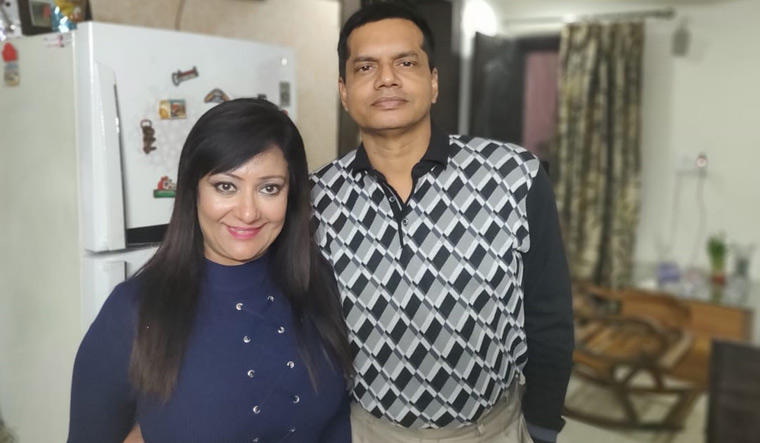
Before joining the Military Intelligence wing (MI), which interprets satellite images, in January 2009, Colonel M.K. Chakraborty had a fantastic military career. As an officer of the Intelligence Corps, he had received commendation twice from the Army chief for his exemplary work. However, within months of joining joining the MI, he became a victim of alleged corporate rivalry. Complaints were raised against him for alleged corruption in procuring of Rs 200 crore worth of equipment to enhance Indian Army’s capability to use satellite images of enemy troop movements and assets. A court of inquiry found him guilty and put him under military arrest for 18 months.
On November 10, the general court martial acquitted him from all charges by calling the court of inquiry (CoI) proceedings a gross violation of Army rules.
“I am acquitted and released from the Army arrest. But who will return eight years of trauma and agony that I and my family had faced. I had given my life to Army, but in return, the Army has given me the taint,” Colonel Chakraborty, who retired last year, told THE WEEK.
It all began in 2009 when Colonel Chakraborty was heading 54 Imagery Interpretation Teams (IITs) in the Indian Army in the Military Intelligence Directorate, which is the nodal agency for processing satellite images and forwarding the same to various Army formations after analysis. MI also gets images from other agencies like the National Technical Research Organisation (NTRO) and the Defence Image Processing and Analysis Centre (DIPAC) to gather technical intelligence.
In order to upgrade the obsolete systems, the Military Intelligence floated the process of acquiring new photogrammetry and geographical information systems. These equipment were essential for getting better clarity from satellite images to track the movements across the border, including military exercises, training and military build-up by China and Pakistan.
During the course of procurement, three of Colonel Chakraborty’s colleagues complained against him on alleged misappropriation of funds in 2011.
As the matter was related to highly sensitive military intelligence unit, the Army headquarters promptly ordered an an internal inquiry into the matter. All complaints were investigated and the matter was closed in August 2011 at Vice Chief of Army Staff level, with remarks that complaints “lack substance” and were “devoid of merit”.
The matter did not end there, and several anonymous complaints were sent to various authorities, including the office of the then chief of Army General V.K. Singh and even the to Central Vigilance Commission. Subsequently, on May 2012, the then defence minister A.K. Antony ordered an enquiry by an Independent Expert Technical Committee (IETC) comprised of officials from ministry of science and technology and scientists from DRDO to look into the allegations. The IETC, after investigations, found the allegations as “lacking substance”.
But, months after change of guards in the Army headquarters—General Bikram Singh took over from V.K. Singh—a lady officer raked up the issue again by sending complaints to the Army chief’s office. The Director General of Military Intelligence wrote to Army chief’s office, informing him about the outcome of the earlier investigation into the matter. Despite suggestions from the DGMI, General Bikram Singh ordered a CoI against Colonel Chakraborty. General Bikram Singh also closed the secret intelligence unit, Technical Support Division, set by his predecessor V.K. Singh.
The then head of Military Intelligence Lt. Gen D.S. Thakur questioned the motive behind the CoI. Coming down heavily on the court of inquiry, he said, ” This court of inquiry is also likely to make a big dent into the morale and operational efficiency of the Military Intelligence Directorate. It has done what the Pakistan’s ISI would have loved to do to our Military Intelligence Directorate.”
Hinting at the internal rivalry in the Amy headquarters Thakur stated, “There is already a buzz in the corridors of the Army HQ and a section of the environment in the Army at large that, this CoI is possibly part of the games being played by the Army hierarchy at higher level at the cost of the junior officers.”
Finally, after four years of inquiry and subsequent court martial proceedings, the General Court Martial headed by Brigadier Anil Singh Chandel, in its order on November 10, acquitted Colonel Chakraborty of all the charges and ordered to release him from Army custody. It also questioned the convening order of the CoI and termed the order as violation. The court martial order also raised issue of documents being tampered, casting aspersions on the fairness of pre-trial procedure.
“The prosecution has failed to adequately counter the contentions of the defence. The court, after having examined the contentions of the defence, reply of the prosecution, legal position in the instant case and after deliberate examination of court of inquiry, hearing of charges and summery of evidence, is of the opinion that accused is entitled to the relief,” Brigadier Anil Singh Chandel said in his order.
Mohammand Mujib, advocate for Colonel Chakraborty claimed that he became scapegoat in the corporate rivalry as well the ego-tussle of top generals of the Army.
“In September 2015, the court of inquiry found eight officers blameworthy but recommended disciplinary proceedings against only Colonel Chakraborty. It clearly shows that entire CoI proceedings were motivated. It is a classic case of misuse of power by higher authorities,” said Mujib.
But, Chakraborty’s ordeal did not end there. Although the court martial ordered release of Chakraborty from the Army custody on November 10, he was released only on November 20, when he had moved the Armed Force Tribunal. Now, the Armed Forces Tribunal has issued a notice to the Army headquarters on the issue.
